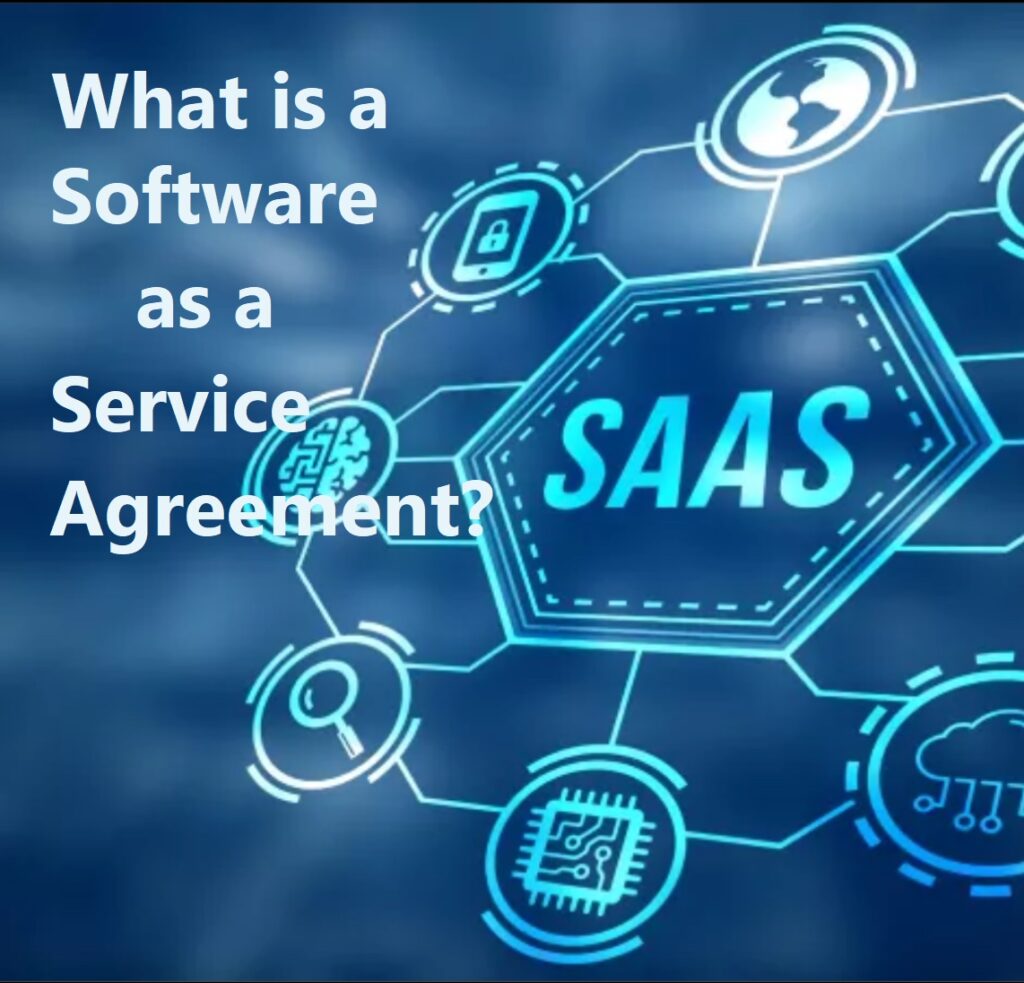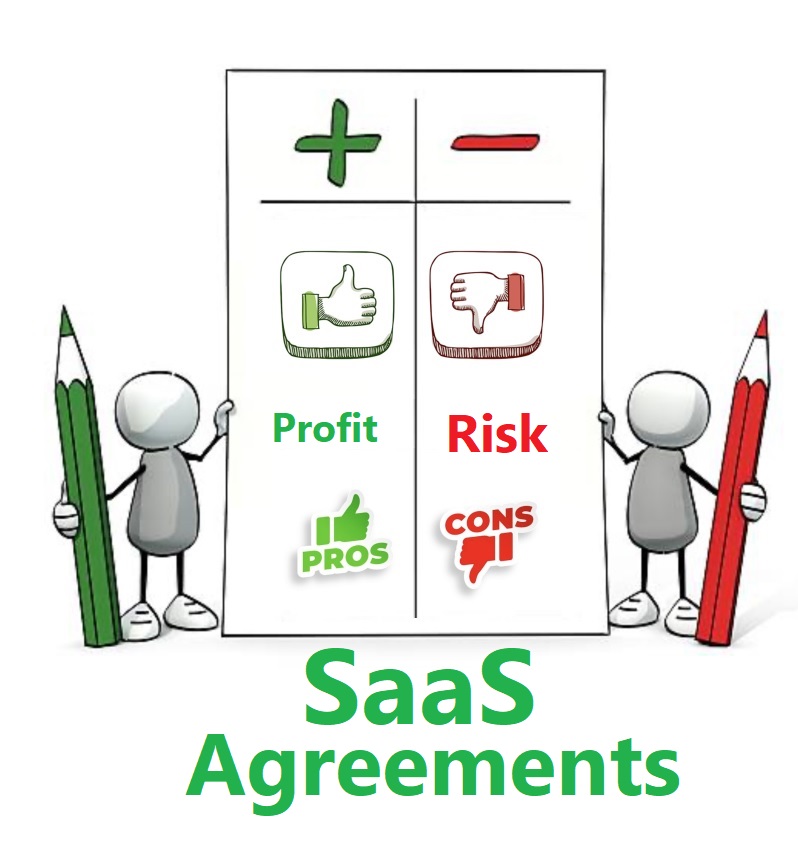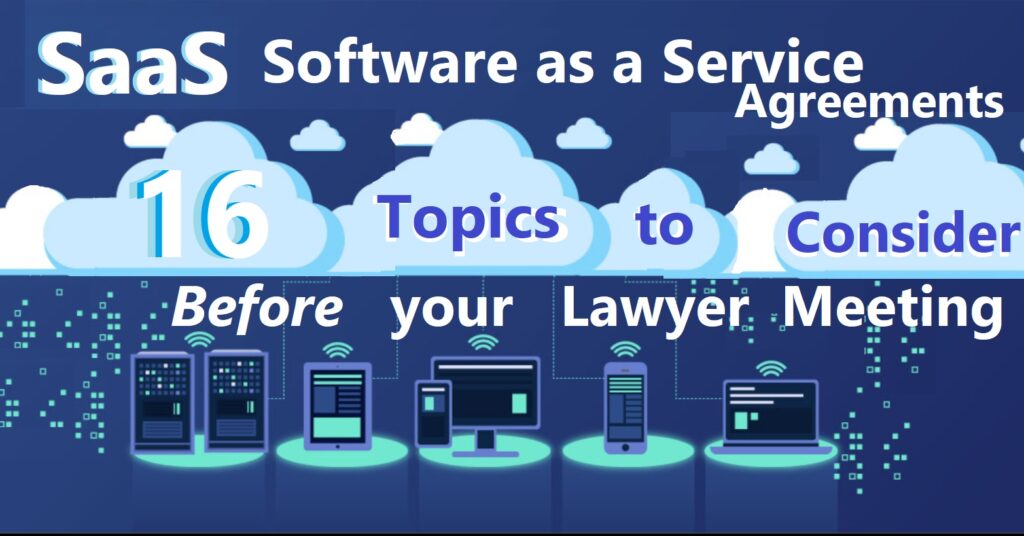Software as a Service agreements: 16 Topics to Consider Before your Lawyer Meeting.

A Software as a Service agreement is a contract between a software owner and its customer for situations when the owner intends to license but not sell its software.
The software and customer data are kept on the vendor’s centralized servers and provided over the Cloud, as opposed to tradition, when the software and data were stored on each customer’s computer. Think of software as a service as permission for use, rather than product ownership.
When Should a Business Choose SaaS as a Strategy?
Advantages and Disadvantages
The SaaS agreement has advantages and disadvantages when compared to traditional software purchases. These include:
- + The customer pays less up front for software use
- + The customer saves cost and expertise burdens by using the vendor’s centralized computing and storage systems
- + The customer’s software is always up to date
- + The customer benefits from software improvements without buying a whole new version
- + The customer is less likely to be locked into a long-term software commitment
- — The customer is locked into the service and does not own the software license when the term ends.
- — The customer may be in trouble if the SaaS vendor lowers quality of service or goes out of business
- + Both the customer and owner are taking advantage of economics of scale, SaaS is more scalable
- + The software owner makes greater profits over time.
- + The software owner has lower physical costs (disks, packaging, retail stores, unsold inventory)
- + The owner has lower product risks because it can quickly address software problems
- + The owner can quickly take advantage of opportunities relating to the software
- — The owner makes less profit per SaaS sale up front



What Questions Should an SaaS Agreement Client Consider Before meeting with their Lawyer?
It is typical for the initial meeting between the SaaS client and the lawyer to be for-the-most-part introductory. The initial meeting covers broad topics. This is because the lawyer will be less familiar with the client’s business. The lawyer will be a legal expert, but not an expert on the client’s software. The client will be unversed in important SaaS contract terms, risks, and options. There are many topics to be broached, explained, researched, and considered. Other employees of the business client may need to be conferred with before a final contract term decisions are made.
It is normal for a Software as a Service agreement lawyer to give “homework” to the client. This homework will be a list of concepts for the client to learn, consider, and decide. This article gives sixteen typical concepts for a client to consider beforehand. These are:
- 1. Pricing: Will the company offer different pricing tiers with different features? Flat Rate? · Pay as it is used? · Monthly? · Quarterly? · Yearly? · Per User?
- 2. Tiers: Will the business offer different SaaS contracts for different customer types? (individual, small business, enterprise)
- 3. Rules of the Road: What must each customer do to access SaaS services? Rules may include identity credentials, intellectual property use, privacy policy adherence, agreement to SaaS contract term changes, and the absence of legal claims.
- 4. Don’t! How can’t the customer use the software? (sharing, criminal activity)
- 5. License Transfer: Will the customer have the right to sell its license to a third party? Can the customer assign its license, say to an agent, an independent contractor, or a customer subsidiary?
- 6. Static or Dynamic? What SaaS terms will or will not be negotiable?
- 7. Who? Who will be allowed users of the software?
- 8. How Many? How many users per SaaS contract?
- 9. Where? Vendor and customer location matters! Jurisdictions have enacted information privacy laws that influence how SaaS vendors and customers must behave. These laws include the CCPA (California Online Privacy Protection Act), the PIPEDA (Canada’s Personal Information Protection and Electronic Documents Act, the GDPR (EU’s General Data Protection Regulation), and the PIPL (China’s Personal Information Protection Law).
- 10. It’s Mine! Clarify who owns the data (what is uploaded to the SaaS business).
- 11. Security: What are the duties between the SaaS vendor and customers – clarify!
- 12. Scope: What is each customer getting? How is each service limited?
- 13. Liability: Under what circumstances will the SaaS vendor be liable? Under what circumstances will the customer be liable?
- 14. Waranties: What is and is not promised by the SaaS company and customer?
- 15. Support: SLA: Service Level Agreements are part of the SaaS relationship. Each SLA details the SaaS vendor’s obligations to take customer queries and fix problems (including response time and expected service obligations). What will be your service level obligation?
- 16. The End: What happens when the SaaS contract ends? Will it be a term without renewal, a renewal, a termination?
- * Potpourri: There are a number of other clauses you and your SaaS lawyer will discuss. These terms will need lawyer interaction. These concepts include term definitions, exclusivity, entirety, venue, choice of laws, arbitration, assignability, credit risk, liquidated damages, indemnification, attorney’s fees, and costs.
There are Online Vendors who Draft SaaS agreements, Cheaply.
Should I use an online Form or spend for an SaaS lawyer?
A number of online vendors offer SaaS contracts as part of an automated contract generation service. These vendors make the contract process quick, easy, and inexpensive. Why not use one?
The short answer is that you should, if you are poor, and have no choice. A general form contract may be better than no contract at all. Software vendors undertake risk with generic form contracts, but there are situations where risk is unavoidable.
Businesses that can afford a SaaS contract lawyer should hire one. After all, the best companies hire specialized lawyers to draft their SaaS agreements and do not touch online vendor SaaS forms for good reasons. SaaS contracts must be drafted with care. There are many ways to draft SaaS contracts. One size does not fit all. What is more, software vendors can get themselves sued and even in criminal trouble by skipping the lawyer step. Suffice to say, if one has a choice, protect your business, protect yourself, ask a competent lawyer.


How Much will a custom SaaS agreement cost?
Lawyers are expensive. It is normal for a contract lawyer to charge $400, $500, $750 per hour, plus support staff costs. It is difficult to generalize how much time a lawyer will spend drafting a Software as a Service contract. This is because the amount of time needed will depend upon client demands. The ingredients to determine the amount of time depend upon contract length, product complexity, service complexity, and tailoring to the laws of a particular jurisdiction (U.S. and E.U. laws will be more involved than Panama).
Ignoring lawyers is expensive. Risks of failing to employ a lawyer to draft a custom SaaS agreement include:
- Costs of business by poorly worded duty clauses
- Getting sued
- Losing your choice of venue
- Losing your choice of laws
- Being forced into court rather than into arbitration
- Exposure to unlimited liability
- Being held to duties you did not intend to undertake
- Losing your business’ IP, and confidential information
- Losing customers
- Criminal charges

My advice is to consider the topics outlined in this article. Research and select a lawyer with experience in the FinTech field. Pay to meet with the lawyer, and then proceed according to your risk tolerance and budget.


Trial lawyer Matt Hamilton graduated from the University of Missouri in 1995 with Science degrees in Logistics, Marketing, and Business Administration. Juris Doctor, 1999

